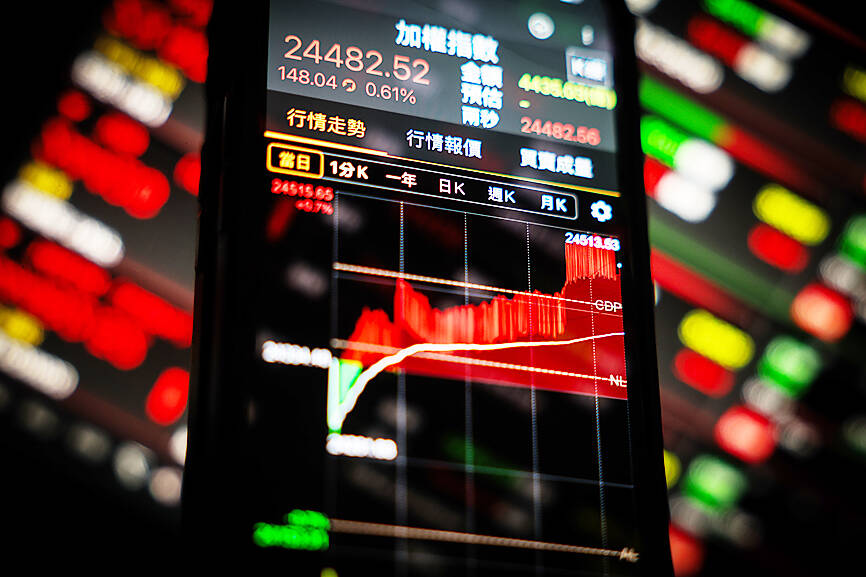Taiwanese shares yesterday closed at a new high as buying in the bellwether electronics sector accelerated following gains posted by markets in the US that pointed to a possible higher opening later in the day.
The local equities also moved higher in line with most Asian markets ahead of talks between US President Donald Trump, Ukrainian President Volodymyr Zelenskiy and European leaders in Washington.
The TAIEX closed up 148.04 points, or 0.61 percent, at 24,482.52, an all-time closing high, after hitting a record intraday high of 24,515.65. Turnover totaled NT$443.503 billion (US$14.76 billion).

Photo: CNA
The closing figure surpassed the index’s previous peak on July 11 last year at 24,390.03, Taiwan Stock Exchange data showed.
The market lost ground in early trading “largely due to fears over a tariff on semiconductors by the United States,” Moore Securities Investment Consulting Co (摩爾投顧) analyst Adam Lin (林漢偉) said.
Those fears were based on reports over the weekend that Trump threatened a levy of as high as 300 percent on semiconductors.
Among the major semiconductor stocks, contract chipmaker Taiwan Semiconductor Manufacturing Co (台積電) closed unchanged at NT$1,180, while United Microelectronics Corp (聯電), a smaller contract chipmaker, lost 1.94 percent to end at NT$40.4.
Application-specific integrated circuit (IC) designer Alchip Technologies Ltd (世芯電子) fell 1.74 percent to close at NT$4,230, while smartphone IC designer MediaTek Inc (聯發科技) bucked the trend to close 1.45 percent higher at NT$1,410.
However, “as investors spotted US stock futures and other Asian markets posting gains, they moved to buy tech stocks outside the IC industry to push the index to a record high,” Lin said. “I suspect the buying largely came from domestic investors.”
Amid optimism over artificial intelligence (AI) development, iPhone assembler and AI server maker Hon Hai Precision Industry Co (鴻海精密) rose 1.45 percent to close at NT$210.
Asia Vital Components Co (奇鋐科技), a supplier of cooling solutions for AI devices, rose 7.01 percent to close at NT$1,145, and printed circuit board maker Wus Printed Circuit Co (楠梓電子) soared 10 percent, the maximum daily increase, to end at NT$102.
In addition, smartphone brand HTC Corp (宏達電子) jumped 10 percent for the second consecutive session to end at NT$51.6 after the company unveiled AI glasses — the Vive Eagle — on Thursday.
“The US tariff issues are expected to continue to affect market sentiment in the short term,” Lin said. “Investors should pay close attention to how foreign institutional investors act in the spot market on Wednesday, the futures settlement date.”
Foreign institutional investors bought a net NT$4.48 billion of shares on the main board yesterday, while local investment trust firms registered a net purchase of NT$1.87 billion, and domestic proprietary traders bought a net NT$7 million, Taiwan Stock Exchange data showed.

In Italy’s storied gold-making hubs, jewelers are reworking their designs to trim gold content as they race to blunt the effect of record prices and appeal to shoppers watching their budgets. Gold prices hit a record high on Thursday, surging near US$5,600 an ounce, more than double a year ago as geopolitical concerns and jitters over trade pushed investors toward the safe-haven asset. The rally is putting undue pressure on small artisans as they face mounting demands from customers, including international brands, to produce cheaper items, from signature pieces to wedding rings, according to interviews with four independent jewelers in Italy’s main

Japanese Prime Minister Sanae Takaichi has talked up the benefits of a weaker yen in a campaign speech, adopting a tone at odds with her finance ministry, which has refused to rule out any options to counter excessive foreign exchange volatility. Takaichi later softened her stance, saying she did not have a preference for the yen’s direction. “People say the weak yen is bad right now, but for export industries, it’s a major opportunity,” Takaichi said on Saturday at a rally for Liberal Democratic Party candidate Daishiro Yamagiwa in Kanagawa Prefecture ahead of a snap election on Sunday. “Whether it’s selling food or

CONCERNS: Tech companies investing in AI businesses that purchase their products have raised questions among investors that they are artificially propping up demand Nvidia Corp chief executive officer Jensen Huang (黃仁勳) on Saturday said that the company would be participating in OpenAI’s latest funding round, describing it as potentially “the largest investment we’ve ever made.” “We will invest a great deal of money,” Huang told reporters while visiting Taipei. “I believe in OpenAI. The work that they do is incredible. They’re one of the most consequential companies of our time.” Huang did not say exactly how much Nvidia might contribute, but described the investment as “huge.” “Let Sam announce how much he’s going to raise — it’s for him to decide,” Huang said, referring to OpenAI

The global server market is expected to grow 12.8 percent annually this year, with artificial intelligence (AI) servers projected to account for 16.5 percent, driven by continued investment in AI infrastructure by major cloud service providers (CSPs), market researcher TrendForce Corp (集邦科技) said yesterday. Global AI server shipments this year are expected to increase 28 percent year-on-year to more than 2.7 million units, driven by sustained demand from CSPs and government sovereign cloud projects, TrendForce analyst Frank Kung (龔明德) told the Taipei Times. Demand for GPU-based AI servers, including Nvidia Corp’s GB and Vera Rubin rack systems, is expected to remain high,